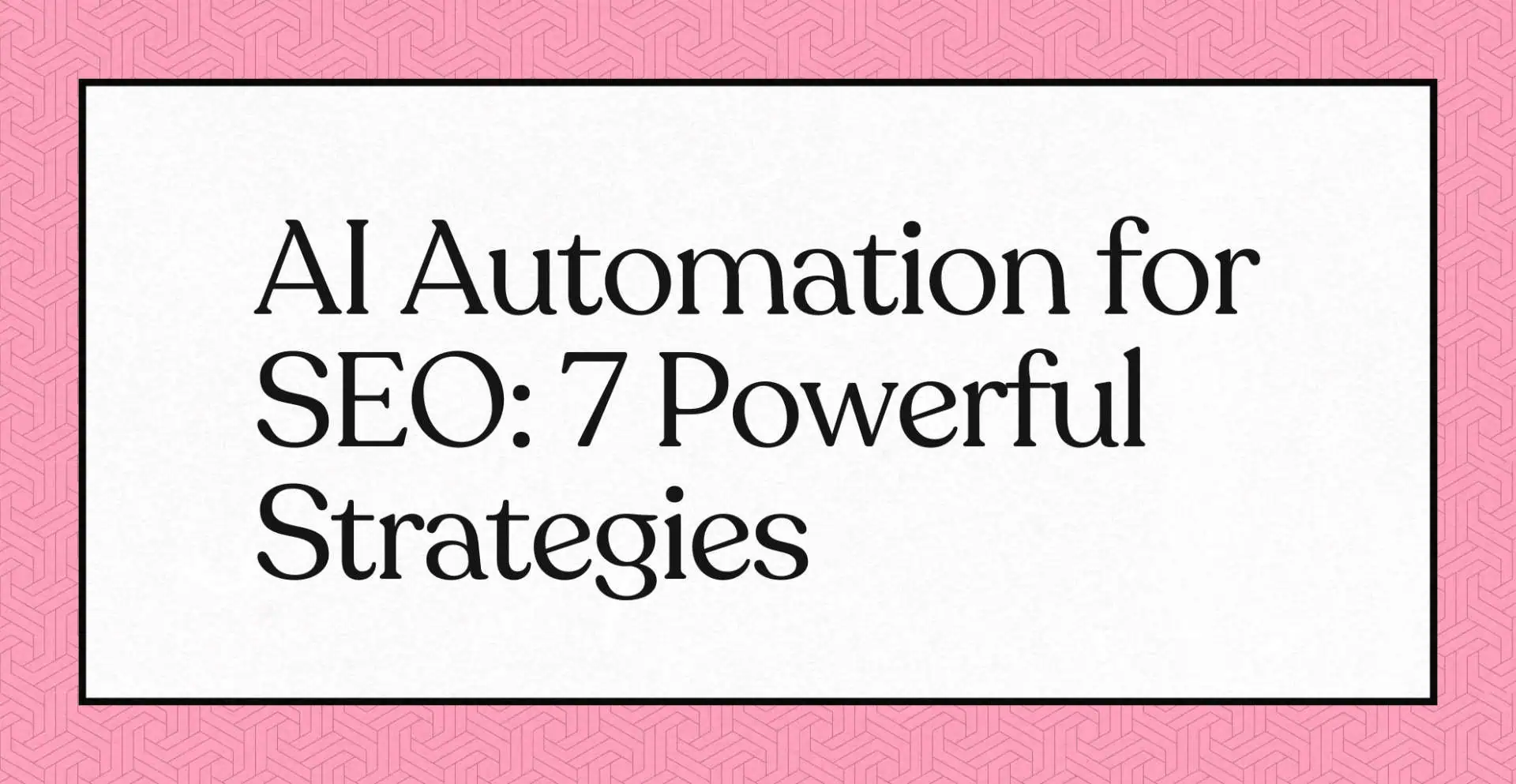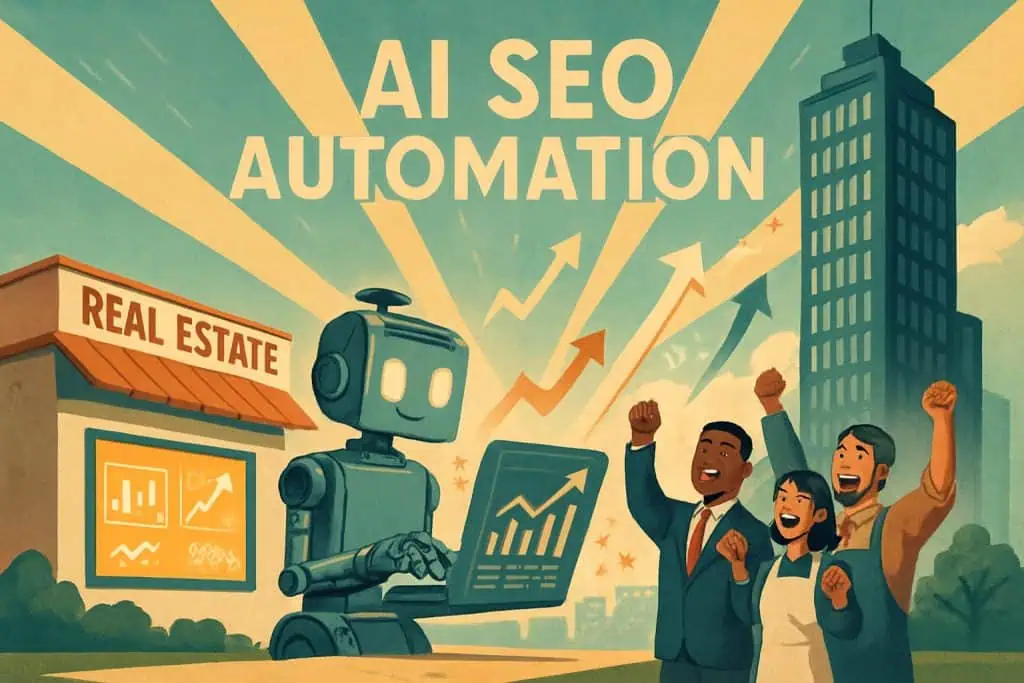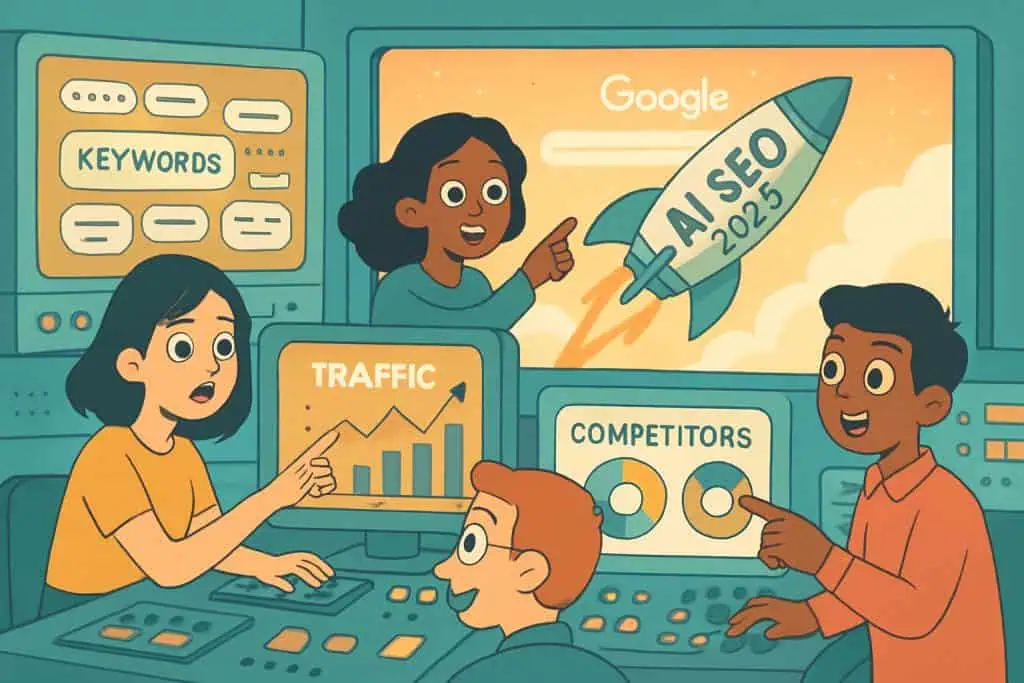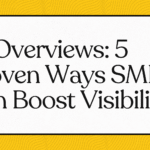Summary
AI automation for SEO is driving measurable growth, with small businesses reporting 60 to 80% traffic gains, faster indexing, and 700+ first-page rankings by leveraging predictive analytics, machine learning SEO, and automated content optimization. Tools like Chatsonic, Surfer SEO, Koala AI, Indexly, SEOtoolbox.io, Semrush, and Search Atlas streamline keyword research, on-page SEO, technical audits, and cross-platform optimization for cost-effective, data-driven strategies. Proactive monitoring and prediction of Google algorithm shifts enable rapid adaptation, improved conversions, and sustained competitive visibility in 2025.
Last week, a small real estate agency in Toronto adopted AI-driven SEO and recorded an 80% surge in organic traffic. More than 700 first-page rankings followed in days. This is not an isolated win but a preview of what businesses can achieve when they integrate AI-driven SEO automation into their strategy.
The SEO industry has changed fundamentally. Where optimisation once meant manual keyword checks and slow adjustments, AI-driven SEO now runs deep analyses, predicts algorithm shifts, and optimises campaigns with speed and precision. By 2025, this approach will have grown beyond keyword targeting into a complete engine that drives measurable growth across entire digital strategies.
The Revolution of AI Automation in SEO
Integrating artificial intelligence into Search optimisation signals a structural shift in online visibility. Today’s AI automation for SEO tools uses advanced algorithms, natural language processing, and machine learning to decode intent, track competitor activity, and generate recommendations that human teams cannot produce at scale. Thisequalisess the playing field. Smaller firms now compete with larger rivals that previously dominated rankings solely on budget.
Research backs the shift. Companies adopting AI automation for SEO are reporting traffic increases of 60-80%, along with notable improvements in engagement and conversion rates. Bounce rates fall, rankings rise, and new business opportunities emerge. These gains show that AI automation for SEO is not a marginal upgrade to traditional tactics—it is a transformation in what Search optimisation can deliver.
How AI Automation Transforms SEO Performance for Small Businesses
Small companies often struggle with limited budgets, lean teams, and strong competitors with more resources. AI automation for SEO changes this dynamic. It gives smaller businesses access to advanced optimisation methods once reserved for big organisations, levelling the competitive field.
Cost-Effective Optimisation
AI automation for SEO reduces costs by automating routine tasks that typically require in-house specialists or expensive agencies. The technology handles keyword analysis, site audits, and ranking adjustments at scale, reducing overhead while delivering data-driven results rather than guesswork. For many small businesses, this means better outcomes at a fraction of the cost of traditional options.
Time Savings Through Automation
Owners and managers in small businesses rarely have time to focus intensely on SEO. AI automation for SEO streamlines repetitive processes, including keyword research, content alignment, competitor tracking, and performance monitoring. Hours previously spent on manual work can now be redirected to sales, product development, or customer relationships.
Data-Driven Strategy Development
Smaller companies typically cannot afford the detailed market studies large competitors rely on. AI automation for SEO closes this gap by supplying granular insights into Search intent, competitor positioning, and content performance. These analytics guide smarter strategy decisions, ensuring that limited marketing budgets are spent where they deliver the greatest return.
With lower costs, reclaimed time, and deeper insights, AI automation for SEO has become one of the most practical growth drivers for small businesses today.
Top 7 AI SEO Tools Revolutionising Strategies in 2025
The AI SEO tool landscape has evolved significantly, with several platforms emerging as leaders. Here are the seven most effective AI automation tools for SEO in 2025:
1. Chatsonic by Writesonic
Chatsonic, powered by AI models such as ChatGPT, Claude, and Gemini, is a comprehensive marketing automation platform that integrates with popular tools, including Ahrefs and Google Search Console. It excels at content creation, SEO optimisation, and performance analysis, offering features such as AI-driven content generation, integrated keyword research, competitor analysis, and performance tracking. With multi-language support and collaborative features, it’s ideal for teams managing global marketing campaigns. Plans start at $20/month, with free trials available.
2. Surfer SEO
This data-driven optimisation tool uses AI to analyse top-ranking pages and provide actionable insights for content creation. Its user-friendly interface includes an AI-powered content editor with real-time optimisation suggestions, a SERP analyser for competitor insights, and NLP-enhanced keyword research. Particularly strong for on-page SEO and content optimisation, Surfer SEO starts at $79/month for individuals, with agency and enterprise options available.
3. Koala AI
Perfect for budget-conscious website owners and content creators, Koala AI offers extensive customisation options for content generation. Users can select tone of voice, set word counts, specify target keywords, customise outlines, and create content in 100 languages. With a generous free tier that allows up to 5,000 words per month (enough for 1-2 articles) and paid plans starting at $9/month for 15,000 words, it’s an accessible entry point for small businesses looking to begin with AI SEO.
4. Indexly
Addressing the critical yet often overlooked challenge of indexing pages by Search engines, Indexly helps new websites and e-commerce stores with multiple product pages to be discovered faster. Features include instant indexing, bulk index capabilities, and comprehensive page inspection tools. For new sites that typically wait weeks for indexing, Indexly’s VIP lane for Search engines can drastically accelerate the process, making it invaluable for businesses launching new content or product pages.
5. SEOtoolbox.io
Combining SEO features with project management capabilities, SEOtoolbox.io offers a comprehensive solution for teams. It includes AI-powered Web audits, task prioritisation, keyword tracking, backlink monitoring, and content optimisation. The platform’s unique integration of project management with SEO tools makes it ideal for agencies and in-house teams coordinating multiple optimisation initiatives. Plans start at $59/month for professionals and $99/month for agencies.
6. Semrush
A veteran in the SEO tool space, Semrush has evolved to incorporate sophisticated AI capabilities. With the industry’s largest keyword database (26.1 billion keywords), it offers AI-powered content templates, writing assistance, and on-page SEO checks. Semrush’s ContentShake AI supports idea generation, outline creation, and content optimisation for target locations. The platform’s comprehensive nature makes it suitable for businesses at any stage of SEO maturity.
7. Search Atlas
Launched in 2024, Search Atlas positions itself as a comprehensive alternative to industry giants like Semrush and Ahrefs. Its standout feature is OTTO SEO, an AI assistant that analyses website data, identifies technical issues, and automatically suggests content improvements. The platform offers detailed insights on organic traffic, keywords, and backlinks, along with features for keyword research, content optimisation, technical audits, and link building. Plans start at $99/month for two user seats and five website projects.
Predictive Analytics
Predictive analytics represents one of the most transformative applications of AI in Search engine optimisation. By analysing historical data patterns and current trends, predictive analytics can forecast future Search behaviours, algorithm changes, and content performance, enabling businesses to stay ahead rather than constantly play catch-up.
How Predictive Analytics Works in SEO
Predictive analytics in SEO applies machine learning algorithms to vast datasets of Search trends, user behaviour, and website performance metrics. These algorithms identify patterns and correlations that would be impossible for human analysts to detect and then generate forecasts for future Search trends, content performance, and ranking opportunities.
The technology operates by analysing multiple factors simultaneously, including:
- Historical Search volume trends across industries
- Seasonal fluctuations in keyword popularity
- Content performance metrics over time
- User engagement patterns
- Competitor ranking movements
This multi-dimensional analysis produces actionable predictions that inform strategic SEO decisions.
Real-World Applications and Results
Businesses implementing predictive analytics in their SEO strategies are seeing significant competitive advantages. For example, a travel booking website used predictive analytics to understand the future behaviour of different customer segments and then created personalised content based on predicted interests. The result was a remarkable 45% increase in conversions from Search traffic.
In another case, a small tech startup utilised predictive analytics to identify emerging technology trends and optimise its content accordingly. This proactive approach helped it secure first-page rankings for key terms related to new technological advancements before competitors could react, substantially boosting its visibility and credibility in a crowded market.
For small and medium enterprises, the benefits of predictive analytics include:
- Improved ranking predictability, reducing the impact of SEO volatility
- Enhanced content relevance through prediction of future Search interests
- Optimised marketing budgets by identifying which SEO tactics yield the best ROI
- Increased user satisfaction through better alignment with evolving Search needs
These advantages create a substantial competitive edge, particularly for businesses with limited resources that need to maximise the impact of every SEO investment.
Machine Learning SEO: Automation Beyond Basic Rules
Machine learning represents the next evolution in SEO automation, moving beyond simple rule-based optimisation to knowledgeable systems that continuously learn and improve. Unlike traditional SEO approaches that follow fixed formulas, machine learning SEO adapts based on performance data and evolving Search behaviour.
How Machine Learning Transforms SEO Strategies
Machine learning algorithms analyse vast quantities of data from multiple sources, including Search results, user behaviour, competitor positioning, and content performance, to identify patterns and correlations that inform more effective optimisation strategies. These systems can detect subtle signals that human analysts might miss and automatically adjust optimisation priorities based on evolving Search patterns.
The key difference between traditional SEO and machine learning SEO lies in adaptability. While conventional approaches often struggle to keep pace with algorithm updates and changing Search behaviours, machine learning systems continuously refine their understanding and recommendations based on real-time performance data. This adaptability is particularly valuable in the constantly shifting Search of 2025.
Limitations and Strategic Implementation
Despite its power, machine learning in SEO has limitations. After a year of testing AI automation for SEO, Dan Sanchez noted, “AI has come a long way, but it lacks the strategic thinking needed to produce consistently high-quality SEO content.” This observation highlights the continued importance of human oversight and strategic direction.
The most effective implementation of machine learning SEO combines algorithmic intelligence with human expertise. Machines excel at pattern recognition, data analysis, and repetitive optimisation tasks, while humans provide strategic guidance, creative insight, and quality control. This collaborative approach leverages the strengths of both machine and human intelligence to achieve superior results.
Automated Keyword Research: Finding Hidden Opportunities
Keyword research is the backbone of SEO, but manual methods are slow and often miss profitable terms. AI-driven SEO automation reshapes the process by uncovering keyword opportunities that traditional approaches overlook, enabling businesses to target terms with the best chance of driving results.
How AI Enhances Keyword Discovery
AI automation for SEO tools processes Search behaviour, intent signals, and competitor positioning at scale. Instead of just listing related terms, they evaluate ranking difficulty, commercial intent, and potential return. Millions of keyword variations can be scanned in minutes, factoring in:
- Shifts in Search volume over time
- Seasonal and geographic patterns
- SERP features tied to each query
- Competitive saturation and authority gaps
- Intent strength behind the keyword
This depth of analysis highlights not only high-traffic keywords but also niche terms with strong conversion potential.
Implementation Strategies for Small Businesses
Small businesses rarely win battles for broad, high-volume keywords. AI-driven SEO automation helps them identify precise, less contested terms where they can realistically rank. By clustering related terms around core topics, they build topical authority while stretching limited resources further.
Practical steps include:
- Running AI automation for SEO tools like Semrush, Koala AI, or GREMI for initial discovery
- Filtering results for the best balance between Search volume and difficulty
- Prioritising terms aligned with business goals and site authority
- Tracking rankings and refining choices as performance data accumulates
The outcome is a focused, ROI-driven keyword plan that avoids wasted effort.
AI Content Optimisation: Beyond Basic Keyword Placement
SEO content strategy has advanced beyond keyword stuffing. AI automation for SEO tools now assesses the top-ranking pages in real time, pulling out structural, semantic, and engagement factors that influence performance.
On-Page SEO Automation
With AI-driven SEO automation, tasks once requiring manual effort—title and meta tuning, header alignment, keyword density checks, internal linking, and schema markup — are streamlined into automated processes. Pages are consistently optimised and delivered faster, reducing missed opportunities and improving ranking potential.
Content Creation and Enhancement
AI automation for SEO also accelerates content creation. Systems can draft outlines based on competitor analysis, identify missing topics, suggest semantic keywords, and recommend optimal length and structure. Existing pages are upgraded with additional data, FAQs, or enriched formatting.
The best results come from blending AI-driven SEO automation with human editorial judgment. Machines provide the scale and insights, while humans refine tone, context, and trustworthiness. This partnership ensures that content meets both algorithmic standards and reader expectations.
AI automation for SEO, when applied to both keyword research and content optimisation, transforms scattered efforts into precise, high-impact campaigns that drive rankings, traffic, and conversions.
Staying Ahead of Changes
Google’s algorithm updates can instantly reshape rankings. Companies relying on guesswork often react too late, but AI-driven SEO automation serves as an early-warning system. These tools detect subtle changes in ranking factors and recommend adjustments before performance declines, enabling businesses to move quickly and protect visibility.
Prediction and Preparation
Predictive analytics powered by AI automation for SEO studies past algorithm shifts and tracks current volatility in Search results. By comparing thousands of signals across websites, these systems anticipate which factors are gaining or losing weight in Google’s evaluation.
When the models indicate likely adjustments, teams receive actionable alerts. This reduces disruption and allows companies to refine their SEO playbook before any official announcement. Instead of scrambling after rankings fall, businesses using AI-driven SEO automation enter update cycles already prepared.
Adaptation and Recovery
Even with preparation, some updates create turbulence. AI automation for SEO accelerates recovery by breaking down the impact into concrete signals. Pages that lost ground are compared to those that gained, revealing specific content or technical factors driving change.
The system then recommends targeted modifications—content revisions, structural tweaks, or backlink adjustments—while predicting the expected outcome of each move. This replaces speculation with tested, data-driven actions.
For smaller businesses without whole SEO departments, AI automation for SEO functions can serve as an expert strategist. Recovery times shrink, wasted effort disappears, and resources are directed only where evidence shows the greatest return.
By combining foresight with rapid adjustment, AI-driven SEO automation turns Google’s unpredictable updates into manageable challenges rather than existential threats to visibility.
Small Business SEO Strategy Framework Using AI
Small businesses face unique challenges in implementing effective SEO strategies, including limited budgets, technical expertise, and time constraints. AI automation creates new possibilities for these businesses to compete effectively in Search results through a structured, efficient approach.
Step-by-Step Implementation Approach
For small businesses looking to leverage AI for SEO success, the following framework provides a systematic path forward:
- Assessment and Benchmark: Use AI-powered audit tools to analyse your SEO performance, identifying strengths, weaknesses, and high-priority improvement areas
- Strategic Keyword Selection: Use AI keyword research tools to identify opportunities that match your authority level and business goals. Focus on terms with manageable competition and clear commercial intent.
- Content Optimisation: Implement AI content tools to enhance existing content and create new assets optimised for target keywords, ensuring comprehensive topical coverage and engagement.
- Technical SEO Automation: Utilise AI-powered crawling and indexing tools to identify and resolve technical issues impacting Search performance, ensuring all content is discoverable and properly indexed
- Predictive Analysis: Apply predictive analytics to anticipate future opportunities and challenges, allowing proactive strategy adjustments rather than reactive responses
- Performance Monitoring: Implement AI-powered tracking systems to continuously monitor ranking positions, traffic patterns, and conversion metrics, providing early detection of both positive and negative trends
- Iterative Improvement: Use performance data to refine your SEO strategy, continuously improving based on actual results rather than assumptions
Resource Allocation for Maximum Impact
AI tools help identify the highest-impact investment opportunities for small businesses with limited resources. Rather than simultaneously implementing every possible SEO tactic, predictive analytics can forecast which actions will most likely generate positive returns for your business model and competitive landscape.
This data-driven prioritisation ensures that limited budgets and time are allocated to the activities with the most potential impact, maximising return on investment and accelerating progress toward SEO goals.
Overcoming Implementation Challenges with AI SEO
While AI offers tremendous potential for SEO improvement, implementing these advanced tools presents specific challenges that businesses must navigate effectively.
Technical Expertise Requirements
Many AI SEO tools require some technical understanding to implement effectively. Small businesses can address this challenge through:
- Choosing user-friendly tools designed specifically for non-technical users
- Utilising vendor training resources and documentation
- Starting with simpler applications before advancing to more complex implementations
- Considering short-term expert consultation for initial setup and strategy development
The learning curve for AI SEO tools has generally declined as vendors recognise the needs of small-business users. Many platforms now offer intuitive interfaces and guided implementation processes.
Data Quality and Integration
AI systems require quality data to generate accurate insights and recommendations. Businesses can ensure data integrity by:
- Implementing proper analytics tracking before beginning AI implementation
- Regularly auditing data collection processes for accuracy
- Integrating multiple data sources for comprehensive analysis
- Establishing baseline metrics before making AI-recommended changes
These data quality practices ensure AI systems have the information to generate reliable recommendations and accurately measure results.
Balancing Automation with Human Oversight
While automation delivers efficiency, human oversight remains essential for quality control and strategic alignment.
Effective implementation involves:
- Reviewing AI-generated recommendations before implementation
- Regularly assessing content quality beyond purely technical optimisation
- Ensuring all content aligns with brand voice and messaging
- Maintaining focus on user experience alongside Search engine requirements
This balanced approach leverages AI efficiency while preserving the human elements that ultimately determine the quality of the user experience.
What’s Coming Next
The adoption of AI in SEO is accelerating, and new practices are beginning to define how Search optimisation will look in the next few years.
Emerging Technologies and Approaches
Multimodal AI is gaining ground. These systems interpret text, images, video, and audio together, making optimisation strategies far more comprehensive across content types.
Predictive intent modelling is another shift. Instead of reacting to a query, AI anticipates user needs by analysing contextual signals. This gives businesses a chance to prepare content that matches demand before it is even expressed.
Automated experience optimisation is changing site management. AI runs continuous testing loops, adjusting layouts, calls to action, and content delivery to maximise engagement and conversions without manual intervention.
Cross-platform optimisation is also expanding. AI tools synchronise SEO efforts across websites, apps, and social platforms, creating a unified presence instead of fragmented campaigns.
Preparing for the AI-Driven SEO Future
Companies preparing for this new environment are investing in structured data management to ensure AI systems can draw on high-quality inputs. They are also building technical knowledge internally while working with specialised partners where needed. Clear measurement frameworks are essential as well, since tracking results is the only way to understand the real business impact of these strategies. Flexibility remains key because Search behaviour and algorithms continue to evolve rapidly.
This adaptive posture ensures organisations stay ahead of change rather than chasing it later.
The Strategic Advantage of AI Automation for SEO
AI automation for SEO has already redefined how businesses reach customers. What was once a manual process filled with trial and error can now be guided by machine intelligence at scale. Companies that use AI automation for SEO consistently see higher visibility, stronger traffic quality, and measurable revenue gains.
Research shows that small and medium-sized businesses, in particular, benefit from adopting AI automation for SEO. Tools that were once limited to large enterprises are now accessible, allowing smaller teams to compete with much larger players. This equalises opportunity and broadens the field.
Case studies confirm that AI-driven SEO automation delivers 60–80% improvements in ranking and engagement metrics, along with lower bounce rates and higher conversion rates. These are not abstract results but practical outcomes that tie directly to growth.
Success, however, depends on balance. The strongest results come when AI-driven SEO automation complements human expertise. Machines handle the heavy lifting of data processing and pattern detection, while human professionals bring creativity, critical judgment, and strategic vision.
Businesses entering 2025 cannot afford to ignore this shift. AI automation for SEO is not a passing trend; it is becoming the foundation of competitive digital strategy. Those who adopt it thoughtfully will hold a clear advantage—those who delay risk falling behind in visibility, traffic, and customer acquisition.
For organisations aiming to secure their position in the evolving Search environment, AI automation for SEO is more than a tool—it is a structural change in how online success is achieved.
Sources
- https://danchez.com/can-you-automate-seo-with-ai-i-tested-it-for-a-year/
- https://writesonic.com/blog/seo-automation
- https://digitalconfex.com/top-10-digital-marketing-trends-you-should-know-in-2025/
- https://screpy.com/predictive-analytics-and-seo-a-perfect-match/
- https://selfmademillennials.com/ai-seo-tools/
- https://arxiv.org/abs/1911.02521
- https://www.gryffin.com/blog/ai-seo-tools
- https://www.ncbi.nlm.nih.gov/pmc/articles/PMC10763197/
- https://seo.ai
- https://www.youtube.com/watch?v=-ZFsozaWMXA
- https://www.alliai.com/ai-and-automation/automate-onpage-seo
- https://www.linkedin.com/pulse/harnessing-power-ai-boost-small-business-seo-stanventures-5pk7c
- https://jklst.org/index.php/home/article/view/267
- https://www.reddit.com/r/SEO/comments/1goo7qc/what_are_the_seo_tasks_that_you_have_automated/
- https://www.singlegrain.com/seo/5-ways-on-how-to-automate-your-seo-processes-in-2025/
- https://www.digitalauthority.me/resources/small-businesses-use-ai-seo/
Q&A
Q: What is AI automation for SEO, and why does it matter for small businesses?
A: It applies machine learning, NLP, and predictive analytics to automate research, optimisation, and monitoring, delivering faster rankings and higher ROI with lean budgets.
Q: Which AI SEO tools lead in 2025 for keyword research and content optimisation?
A: Chatsonic, Surfer SEO, Koala AI, Indexly, SEOtoolbox.io, Semrush, and Search Atlas cover content generation, SERP analysis, indexing, audits, and performance tracking.
Q: How does predictive analytics improve SEO performance and resilience to algorithm updates?
A: It forecasts Search trends and ranking factor shifts, triggers early alerts, and guides targeted fixes to protect traffic and speed recovery.
Q: What AI-driven tactics help small businesses outrank larger competitors?
A: Focus on low-competition keyword clusters, automate on-page SEO and schema, accelerate indexing, and iterate using performance data for continuous gains.






